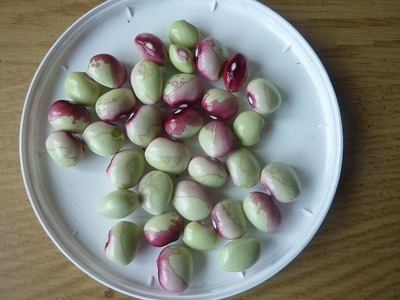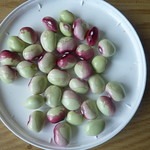
GM/Biotech Crops Report – July 2023
3rd July 2023- GM/Biotech Crops Monthly Reports (BELOW) form part of BCPC’s free three-tier Biotech Crops Info service.
- This service also includes a weekly round-up of news from around the globe – see BCPC Newslink GM Crops section.
- Plus – Free access database on over 300 GM/biotech products covering 23 crops in the global market visit BCPC’s GM/Biotech Crops Manual – Register here for free access.
- Already registered? Click here
GM/Biotech Crops Monthly Report July 2023
Best beans are British Beans?
 Baked beans are made from haricot beans grown in America, Canada, Ethiopia or China but in September Warwick University plans to harvest the first UK crop grown near Lincoln in September.
Baked beans are made from haricot beans grown in America, Canada, Ethiopia or China but in September Warwick University plans to harvest the first UK crop grown near Lincoln in September.
Pic: Andy Roberts
Full Story.
Cancer screening
The NHS is excited about a simple blood test that screens for the genetic code of 50 different cancers. It can pick up 85% of cancers at an early stage when treatment is likely to be more effective:
Virus to deliver huge DNA payload
The Catholic University of America in Washington has found tht a virus that kills bacteria can be used to deliver very large payloads of DNA material to human cells and that it could revolutionise gene therapies since the payload is 20 times larger than can be currently achieved:
New ways to treat cancer
Cancer tumours have a rich microbiome and seeding them with the right bacteria can result in amazing reductions in tumour size. Streptococcus is one bacterium that seems very effective but researchers are gene-editing it to reduce its disease risk and also to improve its ability to stimulate an immune response before injecting it.
Non-transgenic trait transfer
When Agrobacterium is used to transfer DNA to a new plant, the result is a transgenic plant because of the new DNA present. Now Purdue University has modified the Agrobacterium so that after transfer, the new DNA does not persist but degrades and so the new plant is not ‘transgenic’. How the new trait persists is not clear though.
Non-allergenic eggs
Some people are allergic to the proteins in egg white but researchers at Hiroshima University in Japan have used gene-editing to knock out the gene that makes ovamucoid protein in egg whites. This accounts for about 11% of the protein present but means that the egg is no longer allergenic.
Rice blast resistance
Davis University in California and Adelaide University in Australia have collaborated to use CRISPR-Cas9 editing to improve the yield of a rice variety that has some resistance to rice blast and bacterial blight. In trials the yield was increased five-fold and resistance to disease improved by editing the RBL1 gene.
Vitamin D3 in tomatoes
Researchers at Seoul University have used gene editing to increase the presence of Provitamin D3 in tomatoes which gives our skin protection against UV light and is an important precursor of Vitamin D3, an essential steroid hormone.
New drug ingredient supply
Many of the active ingredients in our medicines originate in the natural world but supplies can be limited. Now a company plans to alleviate this supply problem by using engineered yeasts grown in giant vats to produce these ingredients. First batches are expected this year.
Blue tick control in cattle
Oxitec developed the sterility gene that was deployed to control mosquitoes spreading Zika virus in Brazil and now in conjunction with the Roslin Institute, they plan to deploy this technique in blue ticks that attack cattle and are responsible for significant losses globally and this will help to reduce pesticide dependence.
A cure for inherited blindness?
Researchers at Wisconsin Madison University are embarking on a programme of CRISPR gene editing to ‘see’ if they can cure two types of inherited blindness by combining it with a new drug delivery system.
Canada approves testing of RNAi pest control
Instead of treating pests with a pesticide, Canada has approved field testing of spraying the pests with RNAi – switching off essential genes in the pests that are specific to the target organisms and therefore in theory have no off-target effects. First in line is the Colorado Potato beetle.
Easier gene stacking
Oak Ridge national Laboratory has developed a method of multiple gene stacking in one operation. This will speed up development of new organisms with multiple traits and their initial plan is to add up to 12 genes with the possibility of being able to cope with up to 20.
Dairy-free cheese
Climax foods based in California have developed a plant-based casein replacement. This is the essential proteins that gives cheese its texture, stretch and melt characteristics with the benefit of it apparently being allergen–free. If we can reduce the need for cows, we can reduce the methane that they produce.
More vitamin D in tomatoes
Perhaps complementing the work at Seoul University described above, researchers at John Innes Research Centre near Norwich have also developed tomatoes with enhanced levels of vitamin D.
Oral insulin
Insulin to control type 1 diabetes is delivered by regular injections or by an attached insulin pump. The insulin used lacks three peptides found in natural insulin but now a dentist in Pennsylvania has developed a plant-based insulin that is produced in lettuce which can be dried, ground up and taken orally to achieve control of your sugar levels.
THE LATEST ADDITIONS TO THE GM/BIOTECH DATABASE ARE:
The latest approvals of biotech crops to report this month:
- No further additions added to the database in June
FOR INSTANT ACCESS TO GM BIOTECH MANUAL CLICK HERE (Registration required)
Already Registered? Click here to access

